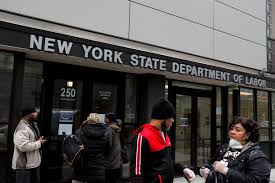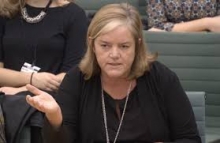Work TV
Watch our TV Channel dedicated to the ‘World of Work’. Explore our video library for informative videos featuring career opportunities at leading companies, franchising opportunities, further education and recruitment professions and their services.
Simon Collyer
DWP Process 2.5 mil Universal Credit Claims
UNIVERSAL CREDIT - Since the start of the coronavirus (COVID-19) pandemic, there has been unprecedented levels of demand for Universal Credit says the government. .
From 1 March to 28 April 2020, DWP has received 2.5 million individual declarations to Universal Credit.
Since 16 March 2020, when the coronavirus lockdown came into effect, DWP has seen 2.3 million individual declarations.
Whilst there is still an increase in volumes compared to normal business, these are now beginning to fall.
Advance payments
At the time of publication, the proportions of advance payments cannot yet be calculated say the DWP as this is normally presented as the percentage of claims which reach the first payment stage and this point has not yet passed for the relevant declarations.
The volume of advance payments has seen a large increase which coincides with the increased number of Universal Credit declarations.
From 1 March 2020 and 28 April 2020, 909,000 advance payments were issued. The majority of these, around 752,000, are new claims and benefit transfer advances which are available to those new to Universal Credit although an increase has also been seen in the budgeting and change of circumstances advances available to those already claiming Universal Credit.
Since the coronavirus lockdown (from 16 March 2020), the DWP has paid around 815,000 advance payments with around 691,000 of these for new claim and benefit transfer advances.
ABC Comment, have your say below:

Press Release ABC Call For Eviction Protection Extension
PRESS RELEASE
For immediate release: Monday 5th May 2020
CALL FOR THE GOVERNMENT TO EXTEND EVICTION PROTECTION
THE ASSOCIATION OF PENSION & BENEFITS CLAIMANTS CIC (the ABC) CALLS FOR A LONGER PREVENTION FROM EVICTION
The Association of Pension & Benefits Claimants CIC (the ABC) is calling on the government to extend tenants eviction protection in line with other countries.
Experience has shown that first time signing on to Universal Credit (UC) people can be facing delays and frustration due to the large number of people signing on and issues, for example, proving their identity, says the ABC.
‘Additionally, when people sign-on they are getting caught out by not understanding how UC works’ says Simon Collyer, founder of the ABC.
How Universal Credit operates is - the assessment period starts on the date that you make your UC claim. The assessment period will last one calendar month. The Claimant should receive their first payment 7 days after the end of your first assessment period. Universal Credit will then be paid on the same date each month.
‘What happens’, says Simon, ‘is people lose their job and then rush to claim Universal Credit’. UC adjusts not to how much work you do, but to how much you earn. So, wages or payments for work still to be paid can be set off against your UC award if it is paid during the assessment period. Employers can be signed-up to the Real-Time Information System - data is provided by HMRC to the DWP and it is exceedingly difficult to challenge this.
Prospective claimants, if they are due to be paid, are deciding not to sign on while wages are outstanding, or this money can be accounted for in the first assessment period and reduce the claimants first Universal Credit payment. ‘We see Claimants baffled as to why they have been awarded, for example, £12 to live on’ however this is one reason why some people get caught out points out the ABC.
Additionally, it can be a shock to go from a well-paid job to be on benefits. It can take time to adjust to living on a lower income. That expensive morning latte once thought to be a necessity needs to be reconsidered. According to research by Turn2Us, the average UK worker is expecting £278 per month less income than they would normally receive and one in eight people are struggling to afford food and basic bills while one in twelve cannot afford cleaning supplies.
A bill is close to being passed in New York to stop evictions for 12 months, although tenants will have to pay any arrears, a similar period of grace as in Australia. In Northern Ireland and Scotland, for example, have elected to prevent evictions for a much longer period. The three-month moratorium in England and Wales looks far from generous says the ABC.
Losing your job can be a huge economic shock. Many people have never claimed benefits before and the frustration, time and worry this can take can be considerable.
We cannot rely on the goodwill of landlords says the ABC, in particular those with business loans and mortgages to pay. Tenants need legal protection until this pandemic is over, and the economy can resume a more normal trajectory.
<end>
- An additional 3.46 million are expected to claim Universal Credit as 15% of working-age adults are going to rely on the welfare state through this pandemic.
- Founded by Simon Collyer and launched on November 5th, 2014, The Association of Pension & Benefits Claimants CIC was founded to help provide ideas, information, and signposting to those claiming state benefits and state pensions. Additionally, to improve the image of those claiming social security.
- The organisation receives information from governments, political parties, think tanks, NGO’s and third-sector organisations.
- The ABC is arguing this point to the DWP, Will Quince MP, Parliamentary Under-Secretary (Department of Work & Pensions and to the Secretary of State for Housing, Communities and Local Government Robert Jenrick.
- Turn2Us: https://www.abcorg.net/item/3347-universal-credit-survey-speaks-of-hardship-particularly-for-new-claimants
Social Security Claims Surge in The UK and the US
UNEMPLOYMENT - New figures have shown 1.8million have claimed Universal Credit, 250,000 claimed jobseekers’ allowance and 20,000 claimed Employment and Support Allowance between March 16 and the end of April.
UC claims are still running at around 25,000 a day and the latest figures suggest around 5million people may now be on Universal Credit in the UK - many of them in work on low incomes.
The Treasury estimate they have spent an extra £6.5bn on welfare benefits since the onset of the pandemic.
Ms Coffey DWP minister announced the figures and admitted people had at first “experienced significant delays in verifying their identity.”
In the US meanwhile, jobless claims top 30 million.
Around 18 per cent of the workforce is currently unemployed. Around 3.8 million more workers filed for first-time employment benefits last week, bringing the national jobless total to a staggering 30 million — or around 18 per cent of the workforce.
Continuing claims, or the number of people receiving ongoing benefits, hit 18 million last week, far surpassing the recessionary peak of 6.6 million, according to data released Thursday from the Department of Labor.
The numbers claiming in the whole of the UK are roughly similar to those claiming in Texas.

Image: US Department of Labor offices, New York.
ABC Comment, have your say below:

Family of Errol Graham Issues Legal Claim Against The DWP
LEGAL - The family of Errol Graham, who died after his benefits were stopped, have issued their legal claim against the government, challenging the DWP’s policy for terminating benefits.
The claim has now been issued in the High Court by law firm Leigh Day who represent Alison Turner, the partner of Mr Graham’s son. They now await a decision from the court on permission for the judicial review to proceed.
Errol died on 20 June 2018, aged 57. He was found in his flat having starved to death, weighing only four and a half stone. His Employment Support Allowance was stopped by the DWP on 10 October 2017 after he failed to attend a fitness to work assessment and as a result his Housing Benefit was also stopped. The DWP tried to contact Errol by phone and then visited his address but he did not respond. As a result the DWP, in accordance with their policy, terminated his benefits without considering whether his mental health could have been the reason for his lack of response and whether termination of his benefits would put him at risk. Despite his long history of severe mental health issues, no information was ever obtained about his physical or mental health and no effort was made to speak to his GP or family members.
In her witness statement given as part of the legal case Alison describes going to Errol’s flat after he died and the indications of his severe mental health problems, including finding teeth that he had pulled out with pliers. There was no food in his flat and he had no credit on his gas or electric meters. A letter was found in his flat that had been addressed but never sent to the DWP that describes his struggles with his mental health and the very low way he was feeling. It pleads with the DWP to “please judge me fairly”.
In her legal case Alison argues that the DWP’s policy on terminating benefits is unlawful for a number of reasons including that it may breach articles 2 and/or 3 of the European Convention on Human Rights which relate to causing serious suffering or death. It is also alleged to be unlawful as it fails to have regard to a claimant’s disability, thereby breaching the Equality Act, and it is inherently unfair as it allows benefits to be terminated with no prior notice to the claimant.

Image: Errol Graham. So mentally ill he pulled out his own teeth.
In addition, Alison argues that the DWP is in breach of its duty under the Human Rights Act and common law to independently and effectively investigate Errol’s death. At Errol’s inquest in June 2019 the DWP stated that it was undertaking a ‘safeguarding review’ which would report in Autumn 2019 and result in updated guidance but none of that has happened. In February 2020 the National Audit Office revealed that there have been a large number of benefit-related suicides. As a result the DWP states that it has conducted internal reviews into those cases and a Serious Case Panel has been established to learn lessons from those systemic concerns, including Errol’s case. However, it is not clear from the information that has been provided by the DWP about the internal reviews and Serious Case Panel how they will feed into improvements to make sure future deaths of vulnerable benefits claimants are prevented. As part of the legal case it is argued that Errol’s family had a legitimate expectation that the safeguarding review would take place, which it did not, that his family should have been involved in the Serious Case Panel and that it should be open to public scrutiny.
Alison said:
“The harrowing things I saw when I visited Errol’s flat following his death will always be with me. It was clear he was in extreme mental distress and anguish. It is impossible to see how a policy could be lawful which allows benefits to be withdrawn for people in these circumstances, with no consideration or investigation of their mental health, and the risks that termination would pose.”
Tessa Gregory, solicitor at law firm Leigh Day, added:
“Our client is being forced to pursue legal action because the DWP has so far refused to make any real changes to the safeguarding policies which allowed her loved one, Errol, to fall through the safety net with such devastating consequences. Like so many other families affected by benefit related deaths the conduct of the DWP following Errol’s death has had a profound impact on our client and her family. She has been appalled by the lack of engagement and transparency and hopes this case will make the Government realise that it can no longer ignore bereaved families and it must urgently address their concerns to ensure that the vulnerable are protected.”
Mental Health charity Mind provided a witness statement in support of the case.
Ayaz Manji, Senior Policy and Campaigns officer at Mind, says:
“We regularly hear from people with mental health problems who need support from benefits that the system often works against them, making them more unwell and even suicidal. The devastating death of Errol Graham has once again shown why the system has to change now. We can’t afford to wait for more people to die or come to harm before taking action.
“The benefits system should be there to protect us when we need it, but right now too many people are in danger of falling through the net and coming to harm as a result. The Department for Work and Pensions (DWP) must stop cutting off people’s support when they’re too unwell to leave the house, or respond to visits and letters. If the DWP can’t get hold of someone, the onus should be on them to proactively get in touch with local services and emergency contacts, to build a full picture and work to getting the individual the support they need.
“During this uncertain time, it’s crucial people can access benefits easily if they need them. It’s appalling that a lack of basic protections means that people still face the possibility of going without money because they are too unwell to engage with the process. The Government must put this right and take responsibility for making sure that those of us with mental health problems are kept safe, and treated with dignity and respect.”

Image: Errol Graham.
ABC Comment, have your say below:

SNP Suggest Replacing Universal Credit Advances With Grants Not Loans
UNIVERSAL CREDIT - The SNP has proposed a solution to overcome UK government concerns with making Universal Credit advance payments grants and not loans – and called for the social security net to be rebuilt after a decade of Tory dismantling.
In the last Work and Pensions Committee session, UK Minister, Will Quince MP, said the UK government fears that introducing advance payment grants for Universal Credit could see an increase in fraudulent claims. The SNP has said the solution to this would be to turn the advance payments – a loan claimants can apply for if they are unable to get by while they wait five weeks for their first Universal Credit payment – into non-repayable grants once the claimant has been deemed eligible for Universal Credit. This would also take away the need to reverse the five-week wait, which the DWP has said would be “operationally challenging.”

Image: Will Quince MP.
SNP Shadow Work and Pensions Secretary, Neil Gray MP, added that the advance payment could be determined on a “slide and scale” basis – dependent on need whereby a parent of two children would qualify for more than a single person – but all would receive an upfront payment to see them through until the first Universal Credit payment and prevent people from falling into, or further into, debt and financial hardship.
The Airdrie & Shotts MP has also called on Boris Johnson to rebuild the UK’s social security net - after his predecessors spent ten years dismantling it - to ensure people are protected if we face another crisis like the outbreak of COVID-19. This includes scrapping the benefit cap and the two-child cap with it's associated rape clause, and increasing all benefits.

Image: Neil Gray MP.
Commenting, Neil Gray MP said:
“Whilst the majority of social security powers remain reserved to Westminster, I am urging the UK government to look seriously at our proposal to implement grants not loans - and heed our call to rebuild the social security net so that future generations are protected if we face a crisis like this again.
“Turning the advance payments into non-repayable grants instead of keeping them as loans once people have been determined as eligible for Universal Credit would help millions now and in the future – it would prevent additional stress and anxiety of further debt, and enable people to start getting themselves out of financial difficulties.
“The Tories spent a decade systematically dismantling the UK’s social security net and now that the chickens are coming home to roost, they are only now realising what a huge mistake that was. It shouldn’t take a global pandemic – and the fact that it is now not only the working class and poor that are having to use the welfare system – for the Tories to sit up and take stock of the situation.
“The SNP will continue to propose solutions and work with the UK government to help them rebuild the vital social security net whilst these powers remain at Westminster. The outbreak of COVID-19 has given us many lessons – a key one being that everyone needs and has the right to a social security net. The UK government must recognise this and act swiftly or devolve the powers to the Scottish Parliament so we can get on with the job ourselves.”
ABC Comment, have your say below:

Government Appoints Dame Louise Casey to Spearhead Homelessness Task Force
ROUGH SLEEPING - The Government has announced that Dame Louise Casey will spearhead a taskforce on rough sleeping during the pandemic. As part of this, a team of experts will advise councils on plans to support rough sleepers into long-term, safe accommodation once the lockdown is lifted.
Jon Sparkes, Chief Executive of Crisis, said: “We are delighted to see the government seize the opportunity to ensure those brought in from our streets as part of the emergency response to the pandemic are not forced to go back to them.
“We look forward to working closely with the taskforce to provide as many people as possible with a home of their own. The past few weeks has seen unprecedented action in an unprecedented situation - but has shown what can be achieved when the will is there.
“We agree with the government that people who are homeless don’t just deserve protection during a crisis – they should have ‘long-term, sustainable and safe accommodation’ when the pandemic is over.”
ABC Note: Dame Louise Casey DBE CB (born 29 March 1965) is a British government official working in social welfare. She was the deputy director of Shelter in 1992, head of the Rough Sleepers' Unit (RSU) in 1999, a director of the national Anti-Social Behaviour Unit (ASBU) in 2003, head of the Respect Task Force in 2005 and the UK's first Victims' Commissioner in March 2010. She became director general of Troubled Families on 1 November 2011. On the 27th February 2020 Boris Johnson appointed her as an adviser to help tackle homelessness, reporting directly to the Prime Minister. Courtesy of Wikipedia

Image: Dame Louise Casey.
ABC Comment, have your say below:

New York City Council Proposes Bill to Extend Evictions Grace Period
USA EVICTIONS - New York State has banned evictions until mid-June, and a bill proposed in the City Council seeks to extend the grace period to April, 2021, in the five boroughs, however renters will have to make up missed payments.
There have been calls for Trump and Governor Andrew Cuomo to cancel rents and mortgages permanently for the duration of the stay-at-home order.
ABC Note: The New York City Council is the lawmaking body of the City of New York. It has 51 members from 51 council districts throughout the five boroughs. The Council serves as a check against the mayor in a mayor-council government model.

ABC Comment, have your say below:

The Housing, Communities and Local Government Committee Will Take Evidence From Secretary Of State For Housing, Communities And Local Government
PARLIAMENT - HCLG Committee to take evidence from Robert Jenrick on Covid-19 response
Monday 4 May, 2.30pm
Watch the session live at www.parliamentlive.tv
The Housing, Communities and Local Government Committee will take evidence from Secretary of State for Housing, Communities and Local Government, Rt Hon Robert Jenrick MP on Monday 4 May in a wide-ranging session examining his department’s response to the Covid-19 crisis.
The Committee will question the Secretary of State on the effectiveness of support for local authorities facing significant financial burdens combatting the effects of Covid-19 while facing a serious downturn in revenues. The Committee heard from the Local Government Association that up to a further £12.8 billion would be needed to cover the financial cost to local authorities, far beyond the £3.2 billion pledged by the Government.
The session will examine the impact of Covid-19 on the social care sector, including provision of PPE for staff supporting vulnerable members of the community. It will also investigate support for those in the private rented sector or who are homeless, and the long-term strategy to support those currently relying on temporary eviction delays or housed in temporary accommodation.
Witness schedule
From 2:30pm
Robert Jenrick, Secretary of State for Housing, Communities and Local Government
ABC Comment, have your say below:

How to Complain to the Department of Work and Pensions (DWP)
COMPLAINTS - How to complain to the DWP. We hope you will find this information useful.
DWP Complaints procedure in their words:
English
How to complain about the service you get from the Department for Work and Pensions or from an organisation that provides its services.
Contents
Mandatory reconsiderations and appeals are different
Complain about an organisation that provides a service for DWP
Coronavirus (COVID-19)
DWP is taking steps to make sure we can continue to deliver essential services, while protecting the wellbeing of our staff and our customers. Our priority is to make sure customers continue to receive their payments and to process new benefit claims. Unfortunately, this may affect the delivery of some other services. This includes responding to complaints, which may take us longer than usual. In these exceptional circumstances, we ask anyone who has already submitted a complaint to be patient and we will respond to you as soon as we can.
A complaint is defined as any expression of dissatisfaction about the service provided which is not resolved by operational staff as normal business.
You can contact us about any aspect of the service you have received, including:
- mistakes that have been made
- unreasonable delays
- how you have been treated
- not being kept informed
- We cannot investigate complaints:
- about government policy or law
- that have already been investigated or are currently being investigated by the Independent Case Examiner or the Parliamentary and Health Service Ombudsman
- that are, or have been, subject to legal proceedings, including legal settlements
Mandatory reconsiderations and appeals are different
We cannot treat a complaint as a challenge to a benefit decision (a request for ‘mandatory reconsideration’) or an appeal against a benefit decision, overpayment decision, child maintenance assessment or sanction.
Read about how to request a mandatory reconsideration of a benefits decision.
You cannot appeal to the Social Security and Child Support Tribunal about a benefits decision until you get a response to your mandatory reconsideration request. This is called a ‘mandatory reconsideration notice’. You can appeal to the tribunal if you think the decision in the mandatory reconsideration notice is wrong.
How to complain
If you would like to complain any aspect of the service you’ve received, let the office you have been dealing with known as soon as possible. We will do our best to put things right.
You can contact us by phone, in person or in writing. When you contact us, please tell us?
- your National Insurance number – unless you are an employer
- your full name, address and contact numbers
- which benefit you are complaining about
- what happened when it happened and how it affected you
- what you want to happen to put things right
State Pension age changes
At present, we are not investigating complaints about State Pension age changes. We stopped investigating these complaints on 30 November 2018 when the issue went before the High Court. Following the High Court’s judgement on 3 October 2019, the claimants applied for permission to appeal. If you have already complained to us, we will write again once the court proceedings have finished. We will continue to investigate complaints not related to State Pension age changes under the normal DWP complaints procedure.
Who to contact
Use the contact details at the top of any recent letters we’ve sent you or use the Who to contact details below.
If you live in Northern Ireland, go to the Department for Communities website for more information.
What happens next
If we have made a mistake, we’ll put it right as soon as possible and apologise immediately. If you’ve experienced unfair treatment or suffered financially, we may consider making a special payment to you.
If you are not satisfied with our initial response, or we need to investigate further, you can ask for your complaint to go to a Complaint Resolution Manager.
They will contact you, usually by phone, to talk about your complaint and agree how to investigate it. They will contact you again within 15 working days to tell you the outcome or when you can expect a response if it will take longer.
If the Complaint Resolution Manager does not resolve your complaint
If the Complaint Resolution Manager does not resolve your complaint, we’ll ask you if you want your complaint to go to a senior manager. If you agree, the senior manager will ask for an independent internal review of your complaint. They will contact you within 15 working days to tell you the outcome or when you can expect a response if it will take longer.
If you are not satisfied
If you’ve been through all our complaints stages, received our final response and still aren’t satisfied, you can ask the Independent Case Examiner to look at your complaint. You must contact them within 6 months of getting our final response and send them a copy of it.
The Independent Case Examiner can’t look at matters of law or government policy. They won’t look at benefit or maintenance decisions, for example, because you can appeal against these.
If they accept your complaint, they will look at what happened and what we did about it. If they think we should have done more, they will ask us to put matters right. They will act as an impartial referee and you will not be charged for their service.
If you don’t agree with the response from the Independent Case Examiner, you can ask your MP (or any other MP) to send your complaint to the Parliamentary and Health Service Ombudsman.
Service standards
Read our customer charter.
Complain about an organisation that provides a service for DWP
Other organisations sometimes provide DWP services, for example Work Programme providers. If you’re not satisfied with the service you’ve received from an organisation like this, complain to them first and give them a chance to put the matter right. If you don’t agree with their response, they must tell you how you can take your complaint further.
If you’re still not satisfied with their final response to your complaint, you can ask the Independent Case Examiner to investigate.
Who to contact
Use the contact details at the top of any recent letters we’ve sent you or the details below.
Access to Work
Telephone: 0800 121 7479
Textphone: 0800 121 7579
NGT text relay (if you cannot hear or speak on the phone): 18001 then 0800 121 7479
Monday to Friday, 8am to 7:30pm
British Sign Language (BSL): video relay service
Watch a video to check you can use the service
Go to the video relay service
Monday to Friday, 9am to 5pm
The video relay service uses a free plugin. You may need to change the security settings on your device to install this.
Attendance Allowance
Telephone: 0800 731 0122
Textphone: 0800 731 0317
NGT text relay (if you cannot hear or speak on the phone): 18001 then 0800 731 0122
Monday to Friday, 9.30am to 3.30pm
British Sign Language (BSL): video relay service
Watch a video to check you can use the service
Go to the video relay service
Monday to Friday, 9am to 5pm
The video relay service uses a free plugin. You may need to change the security settings on your device to install this.
Carer’s Allowance
Telephone: 0800 731 0297
Textphone: 0800 731 0317
NGT text relay (if you cannot hear or speak on the phone): 18001 then 0800 731 0297
Monday to Friday, 9.30am to 3.30pm
Child maintenance
Contact the Child Maintenance Service or Child Support Agency.
Death and bereavement benefits
Telephone: 0800 731 0139
Textphone: 0800 169 0314
NGT text relay (if you cannot hear or speak on the phone): 18001 then 0800 731 0139
Welsh language telephone: 0800 731 0453
Monday to Friday, 9.30am to 3.30pm
Debt Management
Telephone: 0800 916 0647
Textphone: 0800 916 0651
NGT text relay (if you cannot hear or speak on the phone): 18001 then 0800 916 0647
Monday to Friday, 10am to 4pm
Read the Debt Management customer service standards.
Disability Living Allowance (DLA) for people aged under 65
Telephone: 0800 121 4600
Textphone: 0800 121 4523
NGT text relay (if you cannot hear or speak on the phone): 18001 then 0800 121 4600
Monday to Friday, 9.30am to 3.30pm
British Sign Language (BSL): video relay service
Watch a video to check you can use the service
Go to the video relay service
Monday to Friday, 9am to 5pm
The video relay service uses a free plugin. You may need to change the security settings on your device to install this.
Disability Living Allowance (DLA) for people aged 65 or over
Telephone: 0800 731 0122
Textphone: 0800 731 0317
NGT text relay (if you cannot hear or speak on the phone): 18001 then 0800 731 0122
Monday to Friday, 9.30am to 3.30pm
British Sign Language (BSL): video relay service
Watch a video to check you can use the service
Go to the video relay service
Monday to Friday, 9am to 5pm
The video relay service uses a free plugin. You may need to change the security settings on your device to install this.
Employment and Support Allowance (ESA), including ‘new style’ ESA
Telephone: 0800 169 0310
Textphone: 0800 169 0314
NGT text relay (if you cannot hear or speak on the phone): 18001 then 0800 169 0310
Welsh language telephone: 0800 328 1744
Monday to Friday, 8am to 6pm
British Sign Language (BSL): video relay service
Watch a video to check you can use the service
Go to the video relay service
Monday to Friday, 9am to 5pm
The video relay service uses a free plugin. You may need to change the security settings on your device to install this.
Incapacity Benefit
Telephone: 0800 169 0310
Textphone: 0800 169 0314
NGT text relay (if you cannot hear or speak on the phone): 18001 then 0800 169 0310
Welsh language telephone: 0800 328 1744
Monday to Friday, 8am to 6pm
Income Support
Telephone: 0800 169 0310
Textphone: 0800 169 0314
NGT text relay (if you cannot hear or speak on the phone): 18001 then 0800 169 0310
Welsh language telephone: 0800 328 1744
Monday to Friday, 8am to 6pm
Jobcentre Plus
Send your complaint by post to your local Jobcentre Plus office. Find your nearest Jobcentre Plus office.
Jobseeker’s Allowance (JSA), including ‘new style’ JSA
Make an online complaint about JSA.
Telephone: 0800 169 0310
Textphone: 0800 169 0314
NGT text relay (if you cannot hear or speak on the phone): 18001 then 0800 169 0310
Welsh language telephone: 0800 328 1744
Monday to Friday, 8am to 6pm
Maternity Allowance
Telephone: 0800 169 0283
Textphone: 0800 169 0286
NGT text relay (if you cannot hear or speak on the phone): 18001 then 0800 169 0283
Welsh language telephone: 0800 169 0296
Monday to Friday, 8am to 6pm
Personal Independence Payment (PIP)
Telephone: 0800 121 4433
Textphone: 0800 121 4493
NGT text relay (if you cannot hear or speak on the phone): 18001 then 0800 121 4433
Monday to Friday, 9.30am to 3.30pm
British Sign Language (BSL): video relay service
Watch a video to check you can use the service
Go to the video relay service
Monday to Friday, 9am to 5pm
The video relay service uses a free plugin. You may need to change the security settings on your device to install this.
State Pension and the Pension Service
Telephone: 0800 731 0469
Textphone: 0800 731 0464
NGT text relay (if you cannot hear or speak on the phone): 18001 then 0800 731 0469
Welsh language telephone: 0800 731 0453
Monday to Friday, 9.30am to 3.30pm
Find your local pension centre.
If you’re abroad, contact the International Pension Centre.
Social Fund
Telephone: 0800 169 0140
Textphone: 0800 169 0240
NGT text relay (if you cannot hear or speak on the phone): 18001 then 0800 169 0140
Monday to Friday, 8am to 6pm
Universal Credit
Make an online complaint about Universal Credit.
Universal Credit helpline
Telephone: 0800 328 5644
Textphone: 0800 328 1344
NGT text relay (if you cannot hear or speak on the phone): 18001 then 0800 328 5644
Welsh language: 0800 328 1744
Monday to Friday, 8am to 6pm
British Sign Language (BSL): video relay service
Watch a video to check you can use the service
Go to the video relay service
Monday to Friday, 9am to 5pm
The video relay service uses a free plugin. You may need to change the security settings on your device to install this.
Vaccine Damage Payments
Telephone: 01772 899 944
NGT text relay (if you cannot hear or speak on the phone): 18001 then 01772 899 944
Monday to Friday, 8am to 6pm
Complaints about the department
If you have a complaint about the Department for Work and Pensions itself, write to:
DWP Complaints
Post Handling Site B
Wolverhampton
WV99 2GY
DWP complaints data
Read details of the number of complaints received about DWP in each financial year

ABC Comment, have your say below:

Social Bite's Distributes 100,000 Food Parcels
FOOD DISTRIBUTION - Social Bite started distributing food to homeless people and other vulnerable groups on March 20th.
Working with around 60 local grassroots charities and community groups, the charity are distributing food to homeless people as well as families who were relying on free school meals and others in food poverty. Social Bite have seen the demand for free food rise each day as the crisis has deepened. As a result, they have significantly scaled up their production and distribution of food packs.
They have recently passed the milestone of giving out 100,000 food packs. Social Bite are now up to producing and distributing 25,000 food packs per week, so the distribution is expected to rise significantly for the duration of the crisis.
ABC Comment, have your say below:

























